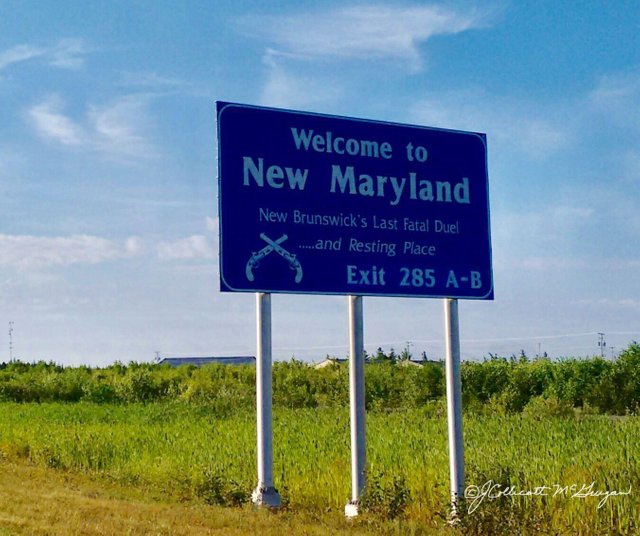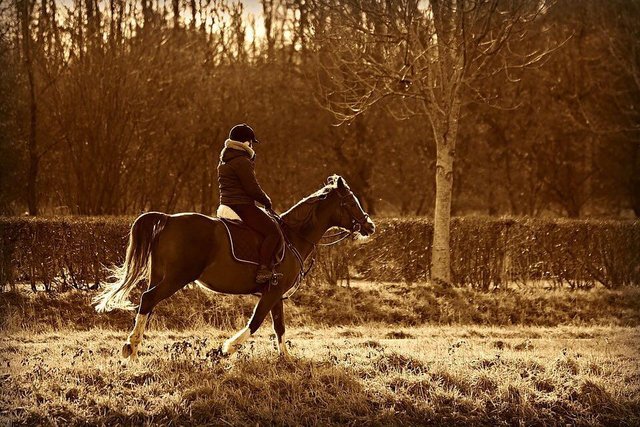The Last Fatal Duel: The Two Georges
The village of New Maryland has an interesting history. It is located outside Fredericton, the capital of New Brunswick, Canada.
It’s claim to fame - last fatal duel was fought there on October 2, 1821.
I have always been interested in this duel and heard about it many times when growing up within a hour drive of the location outside Fredericton.
Every time I drive to my sister’s cottage in New Brunswick I see the sign about the duel. I have written a #blog about it before.
I passed the sign this week and stopped to take the following photo.
The road sign reads:
WELCOME TO NEW MARYLAND
NEW BRUNSWICK’S LAST FATAL DUEL...
and RESTING PLACE
EXIT 285 A-B

Although dueling was a well established practice in Europe by the 1800s and known in Canada, it was illegal by 1821.
Participants in the duel:
The two men involved were respected lawyers both named George.
George Ludlow Wetmore and George Frederick Street, faced each other in the last fatal duel.
How the disagreement started:
Earlier that day Wetmore and Street had been outside the court trading insults in loud voices. The respected Fredericton attorneys had gotten into a dispute over a mishandling of the case and carried their arguments outside the courtroom to Queen street. With raised voices they berated each other with shouts of incompetence and impropriety.
It started over a simple case of mistaken identity over the arrest for Jacob Smith Jr and his father being arrest by mistake.
George Frederick Street, a respected attorney from one of New Brunswick’s most prominent families, had directed the sheriff to arrest Jacob Smith Sr., when the summons had actually been issued for his son, Jacob Smith Jr.
Jacob Smith Sr. was not on good terms with his son anyway. He was angered by this mistake and engaged the service of George Ludlow Wetmore to charge the sheriff with false arrest and imprisonment.
Since the wrong man had been arrested, there was no way to justify the case. Mr. Street, acting for the sheriff, chose to sign a judgment by default and have damages assessed by a sheriff’s jury. The assessment proceedings brough arguments about this procedure and raised questions of legitimacy.
The court adjourned on September 29, 1821, leaving both attorneys in bad humor and carrying their anger out into the street, hurling accusations of incompetence at each other.
George Ludlow Wetmore stewed all evening about the quarrel with the other George as his pregnant wife was putting their four children to bed. He was becoming more agitated about the quarrel and made a fateful decision to defend his honour.
The Challenge for a duel is issued:
At 11 o’clock the next morning, George Frederick Street answered a summons to his door to find John Winslow, acting as second for Wetmore, with a formal challenge to a duel.
Mr, Street was shaken and astonished at this turn of events but agreed to meet Wetmore provided that the duel be fought near Fredericton and as soon as possible.
Winslow tried talking Mr. Wetmore from going ahead with the duel. On Monday, Winslow again went to Mr. Street with the proposal that if he would make a public apology, Wetmore would withdraw the challenge. Street declined, and the parties agreed to meet at Maryland Hill, four miles from Fredericton, the following morning.
The duel was only known to Wetmore, Street and their seconds, Winslow and Davies. The four men were to meet at a clearing behind John Segee’s farm.
The wives and children of the two Georges knew nothing of the fatal duel to take place.
The Duel:
On October 2. Street and his second, Richard Davies, reached the destinated meeting spot at 6 a.m. and waited for Wetmore and Winslow.
When they arrived, the four men then tied their horses and walked to a clearing behind John Segee’s farm, which was hidden from the farmhouse by thick woods.
The seconds, Winslow and Davies, measured off fifteen paces and the principals took their places.
Wetmore brought the two pistols as Street owned no firearms. One gun was slightly inferior to the other. The seconds drew lots, and Street got the better weapon.
The seconds loaded the pistols with gun powder and handed the pistols, fully cocked, to the two Georges.
Standing on the sideline, Davies shouted out the rules,
”Pistols at your sides until ordered to fire; when ordered, raise one arm and fire as quickly as possible without aiming or stopping.”
Fact: No sense in careful aiming as pistols didn’t shoot straight before changes to the calibre were made in 1830.
“Fire!” shouted Davies.
Both men fired, and both stood unhurt. The seconds, greatly relieved, declared that honor had been satisfied and the dueling pistols could be put away.
Wetmore insisted on one more shot. Dueling etiquette demanded an exchange of weapons for a second shot.
Wetmore may have felt confident he could succeed with the superior pistol.
“Fire!” Again a reluctant Davies shouted the command!
Two shots rang out in that crisp morning air of October 2, 1821.....
Wetmore fell to the ground, blood spurting from his arm and head. The ammunition from Street’s pistol had entered Wetmore’s extended arm above the wrist and exited below the elbow before ricocheting into Wetmore’s skull.
Twenty-six year old Wetmore, oldest son of a loyalist elite, was barely breathing.
Street knelt beside his challenger and cradled his bloodied opponent in his arms while John Winslow ran to John Segee’s farmhouse to get help. He wanted to keep this hush-hush and mentioned no names. Dueling was now illegal and the three men were in serious trouble, especially if Wetmore dies...
John Segee sent one of his sons for a doctor. With another son, he helped carry Wetmore to his farmhouse to wait for the doctor.
As soon as Street and the two seconds heard the sound of horses coming, they knew they had to get out of there or be arrested.
They mounted their horses and rode towards St. Andrews. There they acquired fresh horses and headed for the U.S.A., crossing the border at Robbinstown, Maine.

Source
The fatality-Death of George Ludlow Wetmore:
Wetmore was pronounced dead at 10:07 A.M. Friends of the Wetmores were demanding justice and the coroner put out a notice for the other three men involved. A reward of ten pounds was offered but was never claimed.
The fate of the survivor of the duel-George Frederick Street:
Street and Davies decided to leave their fate in the hands of the law and surrendered in December; they were brought to trial on February 21, 1822.
Winslow evaded the law considerably longer.
The trial was presided over by Chief Justice John Sanders. There seemed to be an agreement between the parties involved that Wetmore was as much to blame for his own demise as Street, and there was nothing to be gained from a hanging.
John Segee and his sons, Abraham and Issac, testified they had not recognized the men with Wetmore that fateful morning.
At the trial, the judge instructed the jury,
“Should there be any doubt in cases of this kind, you acquit the prisoners, but in this case it is not in any shape legally brought home…One evidence, mentioning the dress of Mr. Street, said he had on a blue or black. It is proved by two witnesses, one being Street’s brother, that he never wore a blue or black coat.”
The jury voted for acquittal.
After the acquittal George Frederick Street returned home to his family and was restored to his law practice. He ran in politics, representing York County in the elections of 1827 and 1830. He was unsuccessful but later went on to become a judge of the Supreme Court.
Wetmore’s death would forever remain on the conscience of Street.
Street wrote of his thoughts about accepting the challenge of the duel with Wetmore.
“My honour and respectability are dearer to me than life, and when I am placed in a situation that obliges me to sacrifice both the former and risk the latter, I cannot for a moment hesitate which course to take…There are circumstances that may justify a man, even in the opinion of the world, in refusing a challenge, but this was not a case of that description; Had I refused to go out with him, I feel confident that I should have been condemned by every member of society and disgraced.”
The survivor of the duel, George Frederick Street, died at age sixty-eight. His wife and three children had all predeceased him.
The widow of George Ludlow Wetmore lived into her nineties. She never mentioned the duel or ever spoke to the Street family.
Location of Duel: New Maryland, New Brunswick, Canada
Photo of sign taken by me. All Rights Reserved

#thealliance



Welcome back Jo!! 🤗 The duel sounds like both a sad and interesting story. Sad that he couldn't just let it go and for his family that he left behind.
Thanks Dee! ♥️ We stayed a bit longer than planned but had a lovely time. Yes, it is too bad the duel ended in a death. Wetmore seemed to have been bent on having it end one way or the other.
You are welcome Jo!! I'm happy you had a lovely visit!! 💞
Had lots of duels here in the UK but I think they were banned a while back
At one time many duels over property, money, or women, etc.
Thanks for using eSteem!
Your post has been voted as a part of eSteem encouragement program. Keep up the good work! Install Android, iOS Mobile app or Windows, Mac, Linux Surfer app, if you haven't already!
Learn more: https://esteem.app
Join our discord: https://discord.gg/8eHupPq
Much appreciated @esteemapp!
Congratulations @redheadpei! You have completed the following achievement on the Steem blockchain and have been rewarded with new badge(s) :
You can view your badges on your Steem Board and compare to others on the Steem Ranking
If you no longer want to receive notifications, reply to this comment with the word
STOPTo support your work, I also upvoted your post!
Thanks @steemitboard for your calculations. 😊
Excellent story! Interesting that Street survived everyone. I wish he had just apologized though. Is there no honor in that?
Thanks @owasco! Yes, it would have saved a lot of grief If Street would have apologized to Wetmore. I guess once you are challenged to a duel, not following through was a disgrace.
The age old issue of pride at play in this sad story Lady Jo.
Two shattered families the result.
One physically and the other mentally.
To this day pride creates unending problems.
Blessings!
Wetmore’s wife and 4 children must have been devastated when he was killed. The duel certainly left a mark on the survivor too.
Before the fall comes pride or is it -after pride comes the fall?
Blessings, Stephen
What an interesting story, I really get caught up for a few minutes. And it's strong to see that even today there are people who put pride before life!
Thanks @fmbs25. Happy it kept your interest . 😊
Great story, @redheadpei!
Thanks @novacadian. 😊
Simply fascinating! Two families, their fate decided upon the misplaced pride of another. As interesting as duels sounded in stories, I cannot help but wonder why anyone would enter into one, knowing there would be certain death.
Yes! That!
Have a blessed night, Jo!
!tip
Thanks so much Denise. I was just over reading your post- must be great minds think alike 😂
Wetmore and Street certainly took pride to a deadly level.
At the time of the duel, it seemed upholding one’s honor was more important than their life or about their wife and children being left.
🎁 Hi @redheadpei! You have received 0.1 STEEM tip from @dswigle!
@dswigle wrote lately about: Wednesday Walk Feel free to follow @dswigle if you like it :)
Sending tips with @tipU - how to guide :)